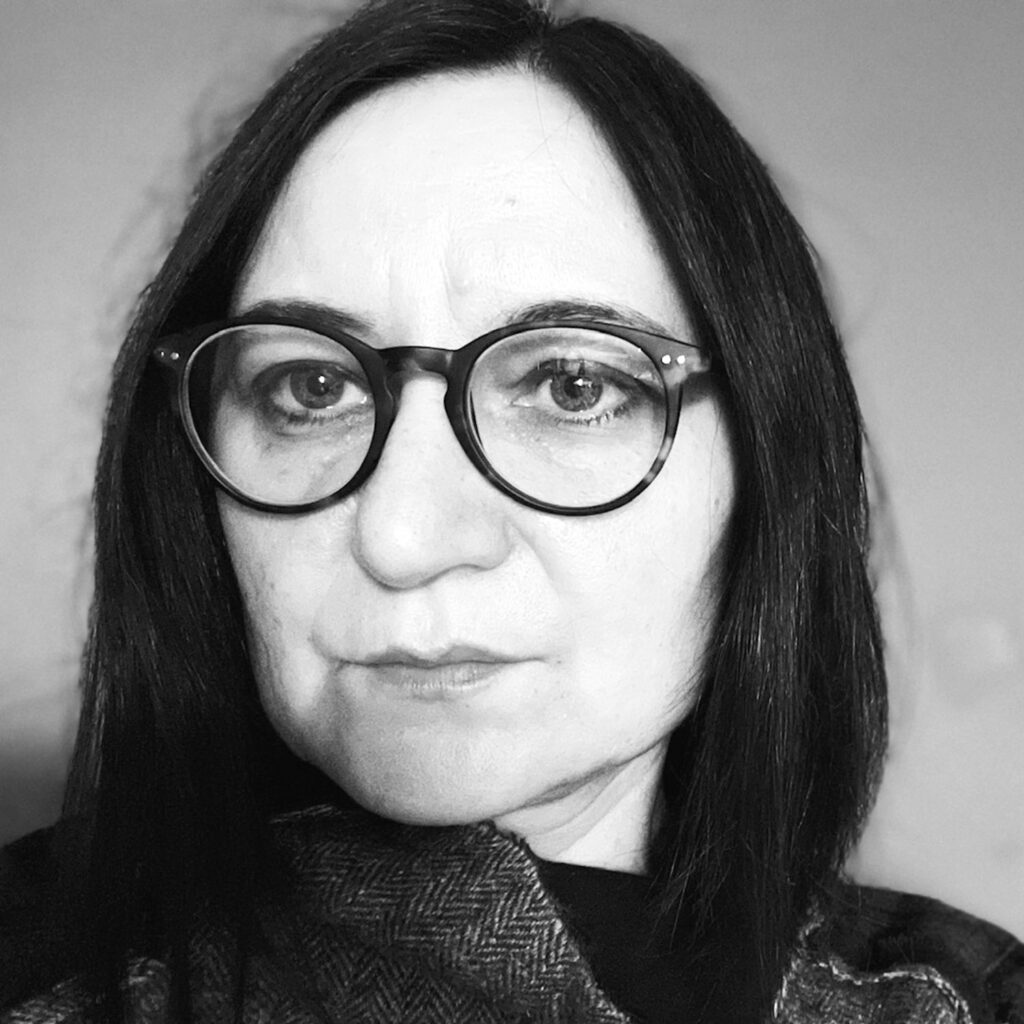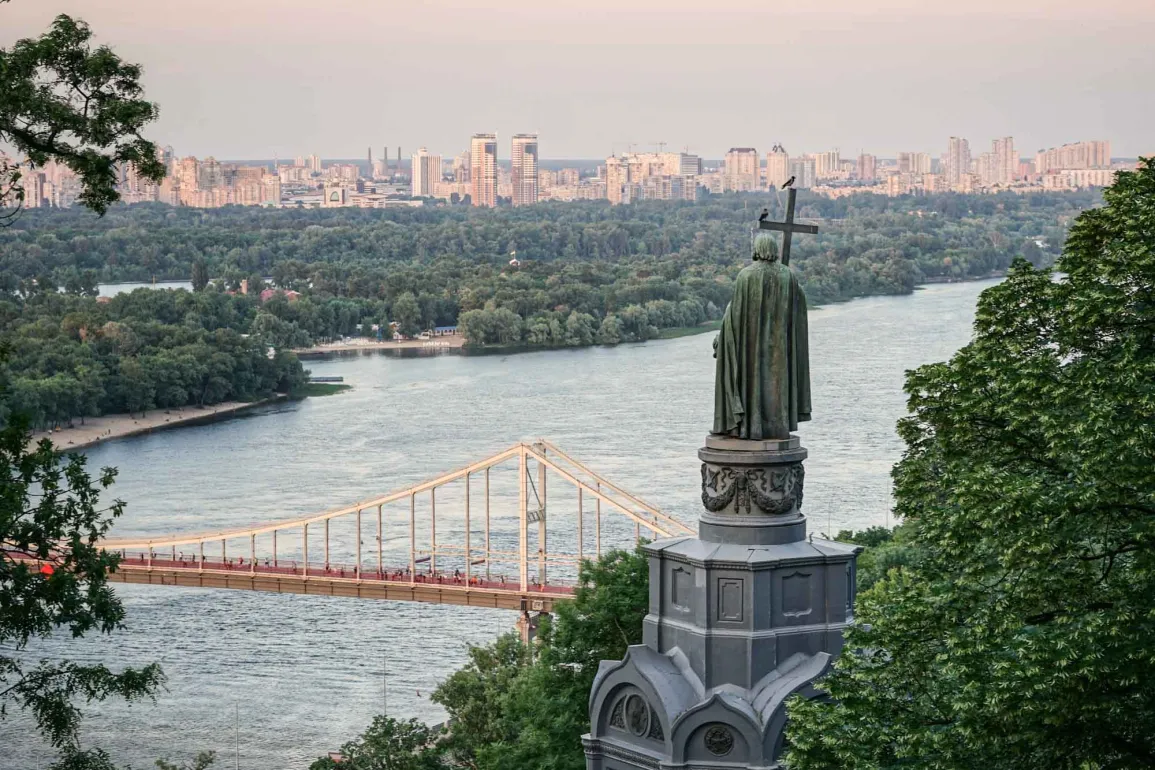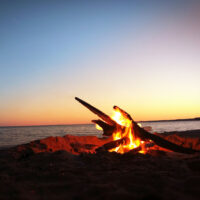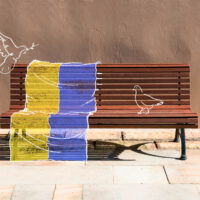A conversation with Yaroslava Black-Terletska, a native Ukrainian and Priest of the Christian Community in Cologne, about the war in her country. Interview conducted by Wolfgang Held.
Three days ago, Russia began its military invasion of Ukraine. What are you thinking and feeling?
Yaroslava Black-Terletska: I am very concerned. I often hear that Ukraine is a young entity, a state that has yet to find itself. This is true if history begins with the decline of the Soviet Union. But if you lift your gaze and look further, Ukraine is an ancient entity. Kievan Rus was an ancient empire from which Ukraine, Russia, and Belarus emerged. It had to assert itself against the Mongols, and the Tatars, proving itself against all kinds of peoples because it was attacked again and again – even by neighboring peoples such as Poland or Germany. Fighting for protection was a way to find oneself. But this is a thing of the past! The fact that such an attack is now coming on our country again, that something like this is happening, is not only a human catastrophe but also a historical one. We should be past this. It feels like the last century, the penultimate century is being resurrected. That’s why many people, both in Ukraine and around the world, feel that it’s wrong – quite wrong – regardless of what you think about Russia, Ukraine, Europe, the EU, or NATO. Beyond all these debates, it is fundamentally wrong. This does not belong in our century. That’s how it feels right now.

A comparison: I heard from Dutch friends that the invasion of their country by the German Wehrmacht in 1940 was so horrible because it was their brother who invaded the country. Is it similar for Ukraine?
Yes, the feeling is similar, because there is linguistic proximity between Russia and Ukraine, just as there is between Germany and the Netherlands. As neighboring countries, you not only have a common history, you also feel connected on a linguistic level. That’s why the invasion is so brutal.
The Russian narrative or war propaganda is that Ukraine belongs to a Russian empire and is not an actual nation. How does this sound to Ukrainian ears?
That sounds horrible to Ukrainian ears because, as I already said, the history of Ukraine is over 1,000 years old. If you want to derive claims from a historical narrative, then the Norwegians could also say that, as Viking founders, they have the right to see Ukraine as part of their country. «We conquered that land once and put our princes and kings on the Russian throne, the throne of Rus, so the land belongs to us.» Fortunately, the Swedes and Norwegians do not think of invading Kyiv now. History is so rich! Many peoples have helped to build the state of Ukraine, and many peoples have been involved, for better or for worse. If such historical narratives were still valid today, then Poland could take Western Ukraine because Galicia was also the home of the Polish King John Sobieski, and he held this area for a time as Poland-Lithuania. Austria could also stand up and say that it claims parts of Western Ukraine because Western Ukraine was very popular in the Austro-Hungarian monarchy under Emperor Franz Joseph. «Our emperor opened up Western Ukraine with railways and good roads, invested in culture.» So, where should we start and where should we end?
Beyond all these debates, war is fundamentally wrong. It does not belong in our century. Yes, that’s how it feels right now.
What is Ukraine? It is located on the edge of Europe, in between Asia and Europe.
It is not on the margins, but actually in the center, between people, religions, and cultures. This central location is both a blessing and a curse. Ukrainians are a people living in the middle of Europe, and yet it does not seem clear from the outside where it belongs. The EU does not dare to admit this to Ukraine.
Ukraine is a big country, where people have finally found themselves, as different as they are. Russians live there, just as Crimean Tatars and Ukrainians, Greek Orthodox, Roman Catholic, Russian Orthodox, Muslims, and large Jewish communities. They all live in this country Ukraine and all of them, now regardless of what language they speak at home and which church they go to, are trying to stand up to the Russian attack. That alone is the answer. So who can still make a claim today and with what argument?
The current war is also a conflict of social systems, between democracy and autocracy. How democratic is Ukraine?
Ukrainians are by nature a mixture of anarchists and democrats. This is a funny mixture: the people of Ukraine do not like it when someone rules over them, determining their lives as a stranger. They prefer to make do with their own president, even if he is stupid or corrupt. If someone from the outside wants to determine the rules of the game, all Ukrainians, no matter in which language they are at home, feel united and resist. This has been the case since the existence of Kievan Rus – a certain stubbornness and resistance towards anyone who comes from the outside and wants to dictate the what and how. It was the same with Christianization. The Latins, as the Christians from Rome were called, came with the intention of prescribing the religion here. Then the not-yet-Christianized resisted – let’s call them residents of Kievan Rus – and said no, we want to vote for ourselves. They chose what they liked. A good example is the self-proclaimed and democratically led Cossack Republic – a protective army against Turkish Tatars, a self-founded brotherhood, and a kind of knightly league. The neighboring peoples also claimed their services. By the way, they are mentioned in the Ukrainian anthem. But when they became too strong, the Russian princess Katherina treacherously destroyed them. This has always been the case in history, even if it’s not perfect, even if it wasn’t so good or the president was incapable. Ukrainians want to decide for themselves. And if they feel that something is not right and someone wants to put a president in front of them, then they fight back. It was the case with the corrupt Yanukovych, paid for by Russia, who enriched himself in our country and did nothing for the country. Ukrainians may be good-natured and perhaps phlegmatic, but if someone goes too far, they fight back.

Russia is now also making claims to be the origin of Kievan Rus.
Well, this is how it is: the claims are not made by Russia, but by the Russian president and his politicians. But they cannot claim this historically, mythologically, or linguistically, because they did not found it. Quite simply. There were many different Slavic and non-Slavic tribes. These were Scythians on this fertile soil: warriors and earth builders. In the 8th century came the Ruriks – the Varangians – who made their way to Constantinople. They settled in these areas inhabited by many small Slavic tribes. Something quite wonderful actually happened, something that is said to be only possible in the Slavic milieu: the foreign conquerors from the North became princes, because they were absorbed into the country itself – into the culture they found and the language they heard. If it hadn’t been for that, we would be speaking a sort of Scandinavian language today. How was this possible? They were absorbed into this people because they loved it and because this culture here is strong, it seems to me. The vitality of this Ukrainian culture – or whatever you should call it – led to tribes from the North giving their own identity to this culture. Helga became Olga, Waldemar became Vladimir. And by the way: at that point in time, Moscow didn’t exist yet.
It makes no difference whether we speak Russian or Yiddish or Crimean Tatar, we are free.
Is there still something of this Nordic influence to be felt today?
Yes, absolutely. Externally, there is a large monument in the center of Kyiv – a sculpture of a large ship with the three Kyi siblings (the name Kyiv is said to come from them), Shchek and Khoryv, and the sister Lybid, who founded a city here in the 6th century. One remembers Prince Vladimir I or Yaroslav, the sage who built many churches 1,000 years ago and initiated a golden age, the heyday of Kievan Rus. They represent all the myths, stories, and legends that surround these Nordic roots. The royal family’s many daughters went as princesses to France, Sweden, Norway, and Poland, and interwove Ukraine with further Western Europe.
Is this coexistence of Slavic and Nordic the reason for the beauty attributed to Ukrainians?
Beauty and the will to fight, yes. I’ll tell you an anecdote. In 2018, we founded the Christian Community church in Kyiv. We had been active for some time, but the official foundation only happened four years ago. We rented a large building in the center of the city for celebrations. Many friends came from abroad, including Georgia, to join. Ukraine has a special, close connection with Georgia, across the Black Sea, but also internally. At these celebrations I met Georgian guests in the center of the city, sitting in a square and looking about. It was time for lunch, so I asked, «Hey friends, why are you sitting here just staring in front of you? We’re going for lunch.» A Georgian man told me with a sigh that he was already satisfied by the sight of Kievan women. We laughed so hard.
What about Crimea? Russia is also asserting claims there, which were enforced through its annexation in 2014.
Crimea belongs to the heart of Ukraine, but it is different than Kyiv. Slavic Christianization was brought to us by Cyril and Methodius, the envoys from Constantinople. An important stop for these early Christians was Crimea. Markus Osterrieder also describes this fact in his book ‹Sonnenkreuz und Lebensbaum› (Suncross and Lifetree). Legend has it that one night they had an inspiration. They could only Christianize Slavs if they developed their own written language for them and wrote a preface to the Gospel of John so that they would be addressed directly with the words: «Listen, O Slavs, to what the Spirit has to say for you.» Then follows the Gospel of John. The inspiration was that this new written language should consist of the three sacred characters for Father, Son, and Holy Spirit, which means circle, cross, and triangle. Many letters could then be developed from these characters. Cyril was familiar with ancient Greek, so it stands to reason that a script close to Greek was created.
Crimea was the place of origin of the Cyrillic script?
This is not about any political questions, nor is it about what Rudolf Steiner said to whom. Not even about the great Russian soul at that moment.
To what extent is Russia’s longing for Ukraine understandable?
It is understandable. Ukraine is like a beautiful garden, especially from a Russian perspective. There, you can relax. A country like a big cottage where you don’t have to take care of yourself. You go there, go on vacation, and people cook good food. This is how it lives in the collective memory from the Soviet era. Cities such as Lviv or Chernivtsi have a European character, also Kyiv and Kharkiv. They are cities with such an established culture that one almost thinks that they’re in Vienna. Russians were very happy to go there on vacation because their own language is understood there – you can still feel at home. Something is taken away from us, where we always liked to go and where we liked to be, this feeling is certainly widespread. You could also go to Georgia in Soviet times, a country that is just as old and beautiful, but with Russian you feel foreign there. This is something completely different. The language creates proximity. But it also makes you vulnerable.
It is a myth. From this perspective, Crimea is something precious, a kind of mystery place that hangs as a tip from Ukraine. It is not an island, but a peninsula, which speaks a geographical language. Catherine conquered the peninsula in 1783 – not so long ago. Later came the treaty with Kruschtschow, who gave the island back to Ukraine. It is therefore not possible to say with a clear conscience that the peninsula has always been Russian. Crimea cannot exist without a Ukrainian water supply, so there were good reasons to give the land back to Ukraine so that people could be supplied there.
Aside from all the horrors this catastrophe entails, what gives you hope?
I have hope when I look at the reports and pictures and read from many friends what is happening during all this need. There is such a great brotherhood, such great solidarity! People help each other, old women make potato pancakes and take them to the soldiers on the street, Mayor Klitschko makes Molotov cocktails with the boys. The president, without any war experience, puts on his helmet and says: «I am here.» You want and have to defend your country and do it together. We will not give up Kyiv. This is a feeling that unites.
The narrative of lies says that Russia must liberate Ukraine from a regime. We do not want to be liberated, we are free. This annoys Putin very much. Ukrainians will not submit in exchange for cheap gas. Stalin did not succeed with the artificial famine against Ukraine either. Four to eight million people died, under the most terrible circumstances. It makes no difference whether we speak Russian or Yiddish or Crimean Tatar – we are free. That’s how people feel. There is now a great bond between Jewish communities, between Crimean Tatar communities, Russian-speaking, Ukrainian-speaking, Polish-speaking communities. Even Roma stole a Russian tank yesterday. Everyone helps as they can. Everyone comes together for freedom. It is about freedom and self-determination.
I was happy about Gerald Häfner’s interview on Ukraine. But he also said that Ukraine was on the margins. There is a linguistic misunderstanding. The name ‹Ukraine› in Russian translation actually means ‹country on the margin› or ‹on the country›. Yes, Ukraine is a fringe from a Russian perspective: after that are the Catholics and the Latin script. If you look at the word from a Ukrainian perspective, then the word ‹Krai› doesn’t mean margin but country and ‹U› means ‹in› and not ‹at›. So U-Kraine means ‹in the country›, ‹in the center of the country›. The ‹margin› is one of the narratives handed down by the Russian side. Etymologically, the people who returned from conquests or journeys afterward said that they were ‹in the country› again, that they were ‹Ukraine› again, that is, back in their country. So the name was formed and was used for a while in parallel with ‹Rus›. And by the way, Johann Gottfried Herder, in his travel journal of 1769, speaks very forward-looking, true words about Ukraine. They should actually be quoted here. But Putin, of course, doesn’t read Herder.
Do I have hope? Yes, yes, yes, I have great hope when I see these people, when I see how the cities are bombed, Kharkiv, Kyiv, Odesa, and the people still do not lose their humor and joke around. And the women give birth at night in the subway station. And everyone celebrates the birth and says: «Now the baby is baptized with fire and water.» What brotherhood reigns there across the nation! As if people, perhaps unconsciously, need to protect some of these precious seeds that Herder spoke of. I also wish for us here, our, my German friends, that they do not remain inactive on the fringes of history, that they do not stick to the explanation of the word ‹from the margin›. I think that this is now the middle and it is about the middle and you have to help. Because the center today is being human today. This is not about any political questions, nor is it about what Rudolf Steiner said to whom. It is not even about the great Russian soul. It will exist, don’t worry, and it too must change. But today it’s about helping my sibling, who is in need before it’s too late. Ukraine, left alone, is defending itself against the monster of the last century, against the burdens of the past. These wars of conquest do not belong in our time. The same holds true for the old thinking about ‹spheres of influence›. This is yesterday’s snow. Today, a relationship can only arise from freedom. People in Ukraine stand for their freedom and for our freedom at the same time – so that we all wake up.













